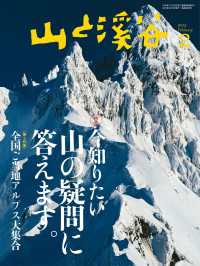- ホーム
- > 洋書
- > 英文書
- > Cinema / Film
基本説明
Over a dozen major scholars and critics take up works by James and Hitchcock, in paired sets, to explore the often surprising ways that reading James helps us watch Hitchcock and what watching Hitchcock tells us about reading James.
Full Description
Henry James and Alfred Hitchcock knew too much. Self-imposed exiles fully in the know, they approached American and European society as inside-outsiders, a position that afforded them a kind of double vision. Masters of their arts, manipulators of their audiences, prescient and pathbreaking in their techniques, these demanding and meticulous artists fiercely defended authorial and directorial control. Their fictions and films are obsessed with knowledge and its powers: who knows what? What is there to know?
The Men Who Knew Too Much innovatively pairs these two greats, showing them to be at once classic and contemporary. Over a dozen major scholars and critics take up works by James and Hitchcock, in paired sets, to explore the often surprising ways that reading James helps us watch Hitchcock and what watching Hitchcock tells us about reading James. A wide-range of approaches offer fresh insights about spectatorship, narrative structure, and cinematic representation, as well as the relationship between technology and art, the powers of silence, sensory-and sensational-experiences, the impact of cognition, and the uncertainty of interpretation. The essays explore the avowal and disavowal of familial bonds, as well as questions of Victorian convention, female agency, and male anxiety. And they fruitfully engage issues related to patriarchy, colonialism, national, transnational, and global identities. The capacious collection, with its brilliant insights and intellectual surprises, is equally compelling in its range and cogency for James readers and film theorists, for Hitchcock fans and James scholars.
Contents
Reading James with Hitchcock, Reading Hitchcock with James ; National Bodies ; Secrets, Lies, and "Virtuous Attachments": The Ambassadors and The 39 Steps ; Henry James and Alfred Hitchcock after the American Century: Circulation and Non-Return in The American Scene and Strangers on a Train ; Colonial Discourse and the Unheard Other in Washington Square and The Man Who Knew Too Much ; Bump: Concussive Knowledge in James and Hitchcock ; James's Birdcage/Hitchcock's Birds ; Sounds of Silence in The Wings of the Dove and Blackmail ; The Perfect Enigma ; Hands, Objects and Love in James and Hitchcock: Reading the Touch in The Golden Bowl and Notorious ; The Touch of the Real: Circumscribing Vertigo ; Specters of Respectability: Victorian Horrors in The Turn of the Screw and Psycho ; Caged Heat: Feminist Rebellion in Henry James's In the Cage and Alfred Hitchcock's Rear Window ; Shadows of Modernity: What Maisie Knew and Shadow of a Doubt ; Awkward Ages: James and Hitchcock In Between ; Works Cited ; Contributors ; Index
-

- 電子書籍
- マンガラバー 分冊版(4)
-

- 電子書籍
- 山と溪谷 2015年2月号 山と溪谷社






